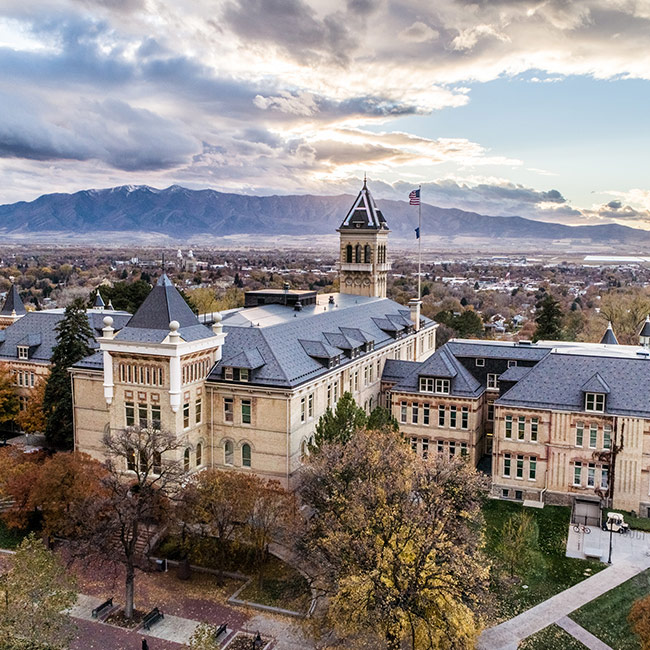About This Degree
Utah State University is the only university in the state with a college devoted to the study of natural resources, and the watershed science degrees are unique in that they allow students the opportunity to integrate physics, chemistry, and biology to understand watershed systems.
Graduates are prepared to work as hydrologists, wetland specialists, and watershed managers for federal and state agencies.
Because USU’s watershed science program is designated as a Western Regional Graduate Program, students from participating western states qualify for in-state tuition. For more information, visit http://wrgp.wiche.edu.
What You Will Learn
Students in the program study water-related physical processes, including climate, surface and ground water, river formation, soil sciences, and water chemistry. This discipline focuses on protecting aquatic systems and includes coursework in hydrology, geomorphology, stream restoration, water pollution, climate change, and aquatic habitats.
Each student has an individualized plan of study created for them by their graduate committee. Students are able to take courses in other departments on campus, including civil and environmental engineering; plants, soils, and climate; and geology. This program encourages students to gain a broad-based education in areas related to watershed systems and water resource use.
Specialization:
Geomorphology and Earth Surface Processes:
The geomorphology and earth surface processes specialization will prepare students for careers in research, monitoring, management and restoration of land surfaces with a particular emphasis on the processes that shape landscapes across multiple scales. A depth of foundational knowledge will be emphasized through geology, hydrology, fluvial geomorphology, fluvial hydraulics and hillslope geomorphology.
Climate Adaptation Science (Watershed Science MS & PhD):
The Climate Adaptation Science specialization provides students with experiences in actionable science through internship and research experiences. Program includes interdisciplinary research to identify adaptive responses to changing climate extremes and two-part internships with agency, NGO, and industry partners. In a first internship, students contribute to projects and learn the workplace cultures and science needs of the host. The internship experiences inform interdisciplinary climate adaptation research by student teams. In a second internship, students share science results and tools with the host organization and help put that science into action.
ADVISING
At a Glance
College: S.J. & Jessie E. Quinney College of Natural Resources
Department: Watershed Sciences Department
USU Locations:
- Logan campus
Program Requirements
Career And Outcomes
Career Opportunities
Graduates in watershed science can pursue the following careers:
- Geomorphology technician
- Environmental consultant
- Watershed coordinator
- Hydrological technician
- Researcher
- Biologist
- Environmental project manager
- Research ecologist
- Forest hydrologist
- Hydrologist
Job Outlook
USU Locations

LOGAN CAMPUS
Admission
Admission Requirements
Students must have a science-based undergraduate degree to be considered.
To be accepted to the program, it is recommended that applicants first contact a specific faculty member with whom they are interested in working. If the faculty member is accepting graduate students and agrees to work with the student, the student can then apply by completing the following application requirements:
Application Requirements:
- Complete the online application
- Pay the $55 application fee
- Have a 3.0 or higher GPA on your last 60 semester or 90 quarter credits
- Provide transcripts of all college/university credits
- Provide three contacts for letters of recommendation
International students have additional admissions requirements.
Deadlines
The department has the following deadlines:
- Fall semester - June 15
- Spring semester - October 15
- Summer semester - March 15
- Preference for financial assistance will be given to applicants who apply before January 10.
Program Requirements
PhD Qualifying Exams:
All PhD students must pass a comprehensive exam. Students take these exams typically the second or third year after most of their coursework is completed. They take a written exam set by their graduate committee, which is usually followed by an oral component where the committee can pose questions to the student regarding the written exam.
Plan Options
Students can receive the MS by pursuing one of two options:
- In the Plan A option, students complete graduate-level coursework and must write a thesis.
- The Plan B option requires the production of a paper or creative work of art and is expected to reflect equivalent scholarship standards as a thesis.
Financial Aid
Most students are supported by research assistantships provided by faculty having grants or contracts. There are no separate applications for financial assistance. All applicants accepted into the graduate program before January 10 will be considered for college and university fellowships and other financial assistance for the following year. Only a few fellowships are awarded each year, usually to PhD candidates.
A variety of funding opportunities are available on the graduate school website.
Take The Next Step
How to Apply
View our step-by-step guide on how to become an Aggie.
Request Information
Contact the School of Graduate Studies to ask questions or receive more information.
Cost and Funding
Calculate the cost of graduate school and learn about funding opportunities.
You May Also Be Interested In

Ecology
Work on exciting research projects with renowned faculty studying ecology through the lens of a variety of different scientific disciplines.

Fisheries Biology
Take the unique opportunity to study freshwater fish populations with hands-on field work and a plan of study created just for you.

Geographic Information Science (GIS)
Develop skills and experience applying industry standard GIS and remote sensing tools to natural resource issues.

Master of Natural Resources
Earn a master’s as a working professional as you take courses to help you become a manager and decision maker in the natural resources field.

